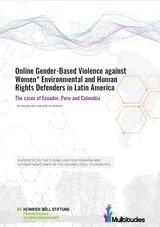Online Gender-Based Violence against Women. Environmental and Human Rights Defenders in Latin America
Women environmental human rights defenders (WEHRDs)1 matters are individuals who identify themselves as women and advocate for environmental rights (International Union for Conservation of Nature [IUCN], 2020a). Because of their role, women defenders are the target of offline and online reprisals (Front Line Defenders, 2024; United Nations General Assembly [UNGA], 2016). Murder is the most extreme manifestation of this violence (Global Witness, 2024).
In 2023, the organization Global Witness (2024) registered the killing of 196 environmental defenders, clarifying that this staggering figure could be even “higher” (p. 14). Over 80% of documented murders occurred in Latin America (Global Witness, 2024). This report investigates online gender-based violence faced by women environmental defenders (WEDs) in Colombia, Ecuador, and Peru. In this research context, online violence refers to attacks perpetrated through digital platforms to intimidate defenders and hinder their activism (Fundación Karisma, 2024; Posetti et al., 2021; IUCN, 2020; UN Women, 2020).
The primary objective of this study is to listen to defenders’ voices and experiences regarding online violence. Thus, this investigation seeks to explore the nature of this violence, its effects on the personal lives and activism of women defenders, and the gaps in existing regulations to adequately protect them through a feminist and intersectional approach.
The research posed the following hypothesis: Online violence is a severe yet underexplored form of aggression against women environmental defenders that increases the risks of experiencing offline attacks with physical and psychological consequences. In order to evaluate this assumption, the methodology combines the implementation of focus groups and semi-structured interviews in Colombia, Ecuador, and Peru, in addition to desk research.
The key finding of this study is the correlation between online and offline acts of violence described by the women defenders: interviewees perceive online attacks as an extension of the offline threats they have experienced. Moreover, participants noted the differentiated impact of this violence based on their gender. The acts of violence shared by participants describe a pattern in which the target of the attacks points out their identities (compounded by the intersection of gender, race, ethnicity, sexuality, and others) rather than their work or ideas. This fact may disproportionately affect women from marginalized groups because the misrepresentation of their identities serves to reinforce harmful social perceptions and norms.
Participants agreed that online gender-based violence heightens their vulnerability in public life. Additionally, the online attacks frequently include their families and collectives. As a result, many of the interviewees chose to restrict and self-regulate their participation in social media platforms.
Existing legal frameworks are inadequate in addressing the implications of online violence against women defenders because of the lack of policies attending to the nuances of this violence and its long-term effects on women defenders. Consequently, participants repeatedly called for better regulations to protect them and their close circles.
Overall, the findings confirm that online violence against WEDs is a systemic issue rooted in historical inequalities and reinforced by patriarchal and colonial structures. For this reason, addressing online attacks requires comprehensive policy reforms and legal protection, training activists, and raising awareness. Ensuring women defenders’ online safety is a matter of justice and a crucial impetus to effectively respond to the climate crisis.
Product details
Table of contents
Acknowledgments... 4
About the Author... 5
Abbreviations... 6
Executive Summary... 7
Introduction... 9
Key Concepts and Definitions... 10
Methodology... 13
Background... 15
Results... 19
Challenges... 23
National Snapshots... 25
Colombia... 25
Ecuador... 29
Peru... 34
Recommendations... 38
A Way Forward... 40
Bibliography... 42
